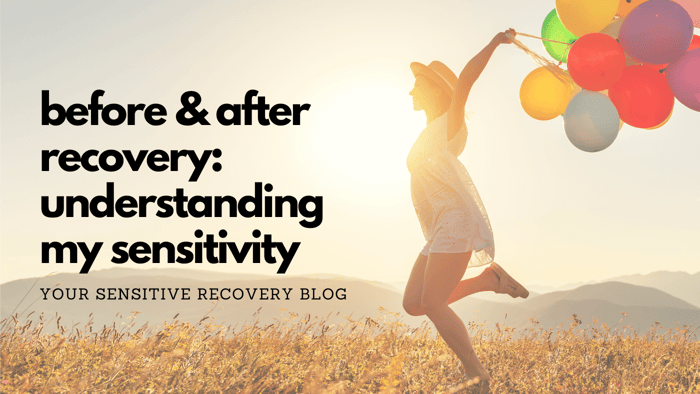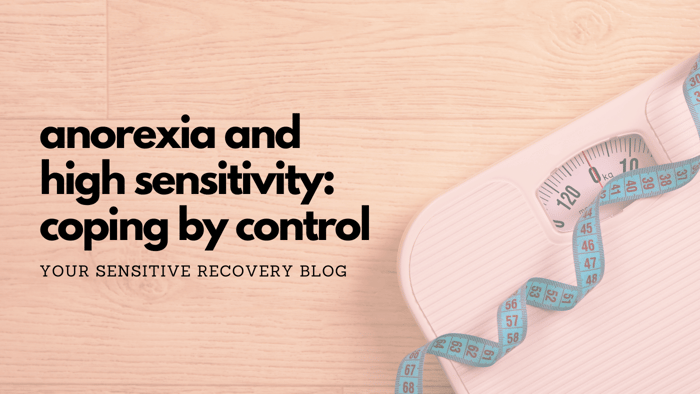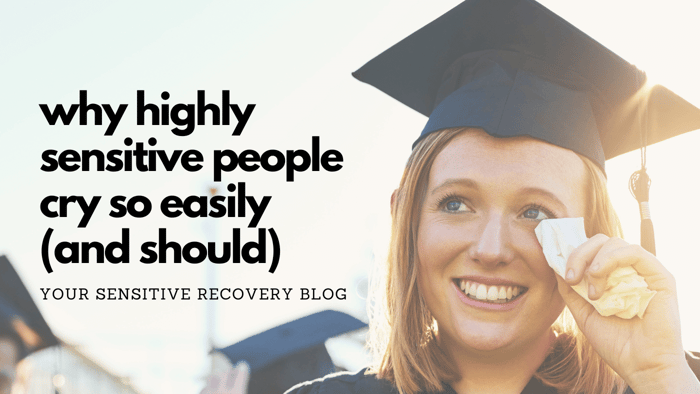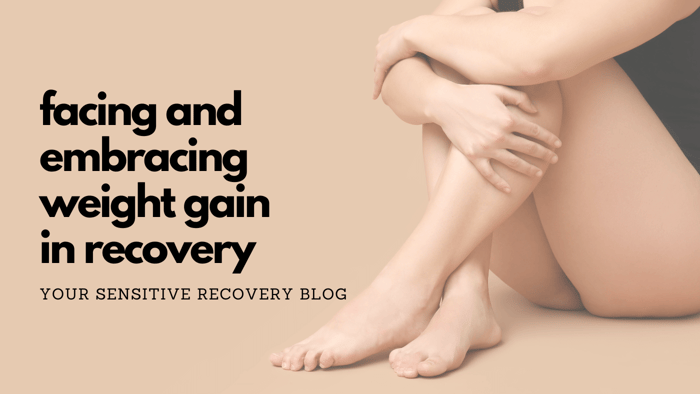Overcoming my eating disorder remains one of the greatest triumphs of my life. But I had no idea then how my High Sensitivity played into my struggles or how embracing it helped me through my recovery and beyond.
Looking back, things make a lot of sense. In many ways, I was walking around like an exposed nerve. I understand why I began to crave the numbing, over-control of anorexia. When it began, I didn't know I'd be falling down the rabbit hole for the next several years, but for a time, it helped. Until it didn't.
This is one story in a million. One in about 28.8 million, to be more precise. That's how many people in the US alone will have an eating disorder in their lifetime.
I believe that many of them will also be Highly Sensitive People.
Bird Funerals
I can trace my High Sensitivity back to infancy (it IS a trait you're born with, after all). I've heard the stories over and over; when family members would coo over me, I'd turn my tiny face away.
"Too close for comfort!", I would have said, if I could.
My mom was struck by how she could hold my brother for hours on end, yet I would push away from her when I was ready to sleep. Sleep remains something I still prioritize, to this day.
As a kid, I spent much of my time outdoors. I loved it. But I would cry if I accidentally stepped on a bug. I facilitated countless funerals for any dead creatures I came across in the woods. I would climb trees and happily pretend to be one of its leaves. I had great friendships in childhood but often felt the need to be alone to recharge. The neighborhood could be oh so loud. The woods were my peaceful place.
At the dinner table, I ate quietly. I processed things a little too deeply to participate much with my mother and brother who were gregarious and quick-witted. By the time I had something to add, the conversation would have moved on. If I knocked something over, I'd leave the table and return soon after with a blanket over my head, finishing my meal like a ghost. Shame was an intense experience.
I believe I experienced my first depressive episode in fourth grade.
I had a particularly loud, angry teacher, who often criticized students. This was a nightmare for me. As a Highly Sensitive child, I was bright, but I didn't perform well under pressure, especially not when I was being yelled at. I complained of stomach aches each day, slowly retreating into myself, until finally, I was transferred to a different classroom, where I slowly came back to life.
Learning to Mask
As I grew older, I became increasingly tired of hearing that I was "too sensitive" or that I took things "too personally." I tried to stifle my emotions, be tough, and be unaffected.
To those who weren't close to me, I was a bit aloof. I learned from a friend or a friend that some called me Ice Queen behind my back. Truthfully, that made me a little proud but it mostly broke my heart because I cherished my compassionate, empathic nature.
I had recurring dreams around this time (and through much of my young adulthood) about tidal waves and tsunamis. I'd watch in horror as a wall of water rose higher and higher, threatening to wipe everything out with its power. Water in dreams tends to symbolize emotions. I understand now that I often felt on the verge of drowning in the intensity of my feelings.
In college, I discovered that alcohol not only kept me on the surface of my frighteningly deep emotional ocean but it quieted my brain enough to allow a fun, carefree persona to take over. I remarked to someone once that I liked myself better when I was drinking. That makes me so sad now.
After a series of distressing events during that time, I felt depression creeping in again. I struggled to maintain my appetite, and without thought or effort, I began to lose weight...and with that, it seemed a switch was flipped.
The Fall of The Ice Queen
I spiraled into an eating disorder rather quickly. This is better than alcohol, I thought to myself. My world narrowed to a singular focus, losing weight. Things got quieter, slower, and dimmer, in a way that felt very addicting.
I felt truly untouchable, for the first time in my life.
I (somehow) managed to graduate and I moved out to Los Angeles. There, fairly support system-less, things got progressively worse. I pursued a career that praised my illness. At a casting call, someone once said to me, "You're so skinny! But not like scary skinny. Cute skinny." I wasn't sure what to make of that but the very unwell part of me heard it as a challenge.
Yet, my brain chemicals could only handle so much self-destruction. Things began to crumble, and I felt worse and worse. At this point, my only coping mechanism was starving, so I leaned on it more.
Recovery didn't really feel possible, but it scared me that I was going to bed with a passive prayer to not wake up, so I sought out intensive therapy. I was ambivalent about doing the recovery work because I had made my disorder a part of my identity. I was embarrassed that I didn't have a "good enough reason" for having developed an eating disorder.
I am just broken, I thought.
During a hospital stay, I cried and cried over peanut butter, not because I was afraid of it - I just didn't have the words then to talk about my sensory struggles with certain foods. My sensitive system had a hard time adjusting to the sudden change in intake. I developed reactive hypoglycemia and was interrogated over and over again about whether I was purging (I was not). I left those encounters in tears, and angry at my body for "misbehaving" whether or not I fed it.
But slowly, I continued to eat, and the fog began to lift. I also felt a deep calling to start using my struggles for the greater good.
Thawing Out
One thing that scared me more than gaining weight was being alone. I knew that my way of coping was also a life sentence of loneliness. That was one emotion I hadn't figured out how to numb. I made skipping meals non-negotiable, and slowly, added other non-negotiables.
No matter how I felt or what I thought, recovery meant I had to feed myself like I would feed a good friend.
By this time, I was finishing up my graduate degree in psychology and was ready to start working with clients. Knowing that others would soon be looking to me for support helped me to kick the remnants of my eating disorder behaviors out of my life. I was intrinsically motivated to show up as the best version of myself that I could be. It felt too incongruent to be helping others learn to care for themselves if I was not also "walking the walk."
Armourless, emotions were hitting me, hard and fast, but I continued to choose to use the tools I'd learned in therapy and in school.
I found myself amazed at how much more quickly my emotions moved through me when I didn't spend my energy trying to ignore, manage, or shrink them. They rose up like giant, intimidating waves but always flopped, innocently onto the shore of my consciousness.
I had made peace with food and made trusting and respecting my body's needs a priority. I began to consider myself recovered when I realized I had been through several extremely difficult periods of time and did not turn toward the siren call of anorexia. That siren call had been exposed for what it was - just a desperate attempt to control and change what was unmanageable at the time.
And it was an attempt that would always, always make things worse in the long run.
Embracing Sensitivity
Fast forward to 2019. My private practice specializing in eating disorder treatment was thriving. I found myself taking a break in the park by my apartment. I had started reading the book, The Highly Sensitive Person by Dr. Elaine Aaron which a fellow therapist had suggested to me. Tears splashed onto the pages as I furiously highlighted words that resonated so, so deeply. I felt seen. "I am a Highly Sensitive Person. This is a thing!"
Ever since then, I've been deep-diving into the science of this amazing trait and how it interacts with eating disorders and the recovery process.
Walking with other sensitive souls on their healing journeys has become one of the best parts of my life. I am motivated each day to offer a more personalized form of therapy and eating disorder recovery that better supports sensitive folks.
I actually feel more sensitive now than I did in my youth. This is not uncommon with HSPs as we age. Partly, my sensory needs are shifting, and my stimulation threshold is lowering but mostly, I think it's because I have dropped the mask. I am who and what I am. I am no longer an Ice Queen. I have melted into a puddle. Puddle Queen, perhaps. 😂 (I can indeed easily become one over a commercial, seeing someone kill a spider rather than kindly deliver it outside, or a random, viral engagement video.)
High Sensitivity is a package deal.
While a tendency for overstimulation can be a frustrating liability to manage, the other characteristics of this trait are true assets. Gifts, really. And more than the overstimulation ever did, it was the misunderstanding and rejection of my trait that made life as an HSP difficult.
Awareness is such an important step in growth. This was true for my eating disorder recovery and especially true with my High Sensitivity. Befriending my trait has allowed me to learn how to better structure my life and support my needs. I am no longer exhausting myself trying to live like a non-sensitive person.
Acceptance is another critical part of growth, after all.
🌻
✨ Josie Munroe, LMFT is a licensed therapist and owner of JosieMunroe.com and Your Sensitive Recovery As a recovered clinician and Highly Sensitive Person, she loves supporting others on their journeys to form new, empowered relationships with food, their bodies, and their sensitivity. Join the newsletter for a weekly boost of hope and inspiration. You deserve a recovery that works for you! ✨





